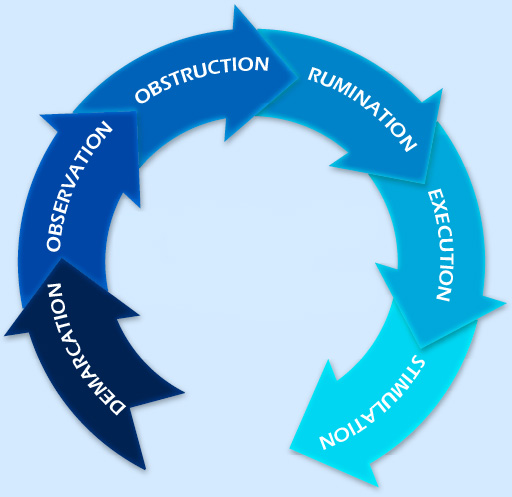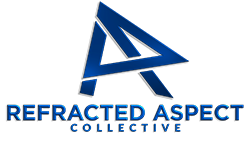Individualised business coaching designed specifically for you
Our Proprietary DOORES Methodology

How It Works
Demarcation
Conceptualise who you are
Demarcation might sound like a strange descriptor for the initial phase of our individualised business coaching methodology but the reason we use this term is to accentuate that you, as a unique individual, have a distinct personality, beliefs, values etc. that influence your behaviours. In order to customise the business coaching you receive, we first need to conceptualise who you are.
As a simplistic example, we wouldn’t take an introverted person and develop a multi-step action plan that has lots of extroverted steps. This is one of the things that makes Refracted Aspect’s individualised business coaching different to others.
During this phase, we utilise some quick and easy self-report psychometric tests to help us understand your personality traits, emotional intelligence, locus of control, level of self-monitoring behaviour etc. The results of course are completely confidential, and have the added effect of getting you reflecting in an honest fashion – a key to being successful and getting the most out of our individualised business coaching.
Demarcation
Conceptualise who you are
Demarcation might sound like a strange descriptor for the initial phase of our individualised business coaching methodology but the reason we use this term is to accentuate that you, as a unique individual, have a distinct personality, beliefs, values etc. that influence your behaviours. In order to customise the business coaching you receive, we first need to conceptualise who you are.
As a simplistic example, we wouldn’t take an introverted person and develop a multi-step action plan that has lots of extroverted steps. This is one of the things that makes Refracted Aspect’s individualised business coaching different to others.
During this phase, we utilise some quick and easy self-report psychometric tests to help us understand your personality traits, emotional intelligence, locus of control, level of self-monitoring behaviour etc. The results of course are completely confidential, and have the added effect of getting you reflecting in an honest fashion – a key to being successful and getting the most out of our individualised business coaching.
Observation
Situation, goals and perspectives
Once we’ve got a good grasp on your personality, beliefs and values, the Observation phase is where we learn about what you’re wanting to achieve. We talk more openly about your current situation, the goals you have for your professional or personal life and any thoughts you have on accomplishing them.
We also start talking about your strengths, weaknesses, personal thoughts and feelings as they relate to your environment. We also want to understand at this phase any steps you’ve previously tried to progress your goals, especially if things didn’t turn out the way you had hoped. We tend to learn more from our failures than we do our successes and putting yourself into a reflective mindset for this phase is paramount to success.
At the conclusion of this phase we have a clear understanding of you as the inidividual, but in the next phase we dive more deeply into barriers and obstacles, both internal and external.
Obstruction
Identify to eliminate
The Obstruction phase is all about identifying obstacles to your success, so that we can develop the multi-step action plan with these factors in mind. These obstacles can be a part of your micro-environment i.e., internal to you, or they can be part of the macro-environment i.e., your workplace.
Examples of micro-environment obstacles could be skills gaps or individual resource availability such as time or motivation. For example, if we identify a particular skill that you need, it could be as simple as reading a book or do you really need a university qualification? The answer depends on your particular circumstances.
The macro-environment is typically more challenging due to the dynamic nature of your professional environment and the people within it. Examples of obstacles in this instance could range from competition for advancement from colleagues, a manager with a long tenure limiting your upward mobility or dysfunctional leadership or lack of strategy within the organisation.
Obstruction
Identify to eliminate
The Obstruction phase is all about identifying obstacles to your success, so that we can develop the multi-step action plan with these factors in mind. These obstacles can be a part of your micro-environment i.e., internal to you, or they can be part of the macro-environment i.e., your workplace.
Examples of micro-environment obstacles could be skills gaps or individual resource availability such as time or motivation. For example, if we identify a particular skill that you need, it could be as simple as reading a book or do you really need a university qualification? The answer depends on your particular circumstances.
The macro-environment is typically more challenging due to the dynamic nature of your professional environment and the people within it. Examples of obstacles in this instance could range from competition for advancement from colleagues, a manager with a long tenure limiting your upward mobility or dysfunctional leadership or lack of strategy within the organisation.
Rumination
Collaborative Brainstorming
By the time we reach the Rumination phase we’re ready to get to work brainstorming your multi-step action plan with you. Having gotten to know you personally and the environment you’re working within we’re able to align this plan with your personal attributes and maximise your chances for successful execution.
As we develop your multi-step action plan it is always important to try and consider different perspectives, possibilities and what-if type scenarios. This allows you to effectively pivot when you’re hit with a road block while also ensuring we’ve come up with the best approach that is tailored to you.
The last element of the Rumination phase is to establish a range of metrics, KPI’s or key achievements along the path of your multi-step action plan. This ensures we’re tracking both your successes and failures, while having a good grasp on what we need to modify on future reviews.
Execution
Controlling the outcomes
The Execution phase is all about you getting things done. That isn’t to say we’re not here to support you and answer questions, but this is where you take the agreed multi-step action plan and actually put it into action.
Apart from actually executing the plan, the most important aspect of this phase is reflecting on what you’ve managed to achieve. Reflecting on oneself is a difficult task to do well but with practice it gets easier. Depending on the individual steps in your multi-step action plan, you’ll probably find it makes sense to reflect on a weekly basis, but if you can make it work, do it more regularly while things are fresh in your mind.
As part of this reflection, we’re really interested in identifying obstacles that were overlooked in the Obstruction phase, or have formed in the time since, so that we can modify your plan to address these new elements.
Execution
Controlling the outcomes
The Execution phase is all about you getting things done. That isn’t to say we’re not here to support you and answer questions, but this is where you take the agreed multi-step action plan and actually put it into action.
Apart from actually executing the plan, the most important aspect of this phase is reflecting on what you’ve managed to achieve. Reflecting on oneself is a difficult task to do well but with practice it gets easier. Depending on the individual steps in your multi-step action plan, you’ll probably find it makes sense to reflect on a weekly basis, but if you can make it work, do it more regularly while things are fresh in your mind.
As part of this reflection, we’re really interested in identifying obstacles that were overlooked in the Obstruction phase, or have formed in the time since, so that we can modify your plan to address these new elements.
Stimulation
Magnify or nullify
The final stage in our proprietary DOORES business coaching methodology is the Stimulation phase. During this phase we review the outcomes of the Execution phase and get a grasp on what you’ve managed to achieve in the time since our last meeting. Depending on things you’ve identified when reflecting on your plan execution, we may revisit any of the first four phases, so as to factor additional things into the multi-step action plan.
Successes and failures are equally important at this phase. For successes, we’re looking to replicate or amplify; for failures, we want to remove or nullify. Why was a particular action successful while a different action was not? How can we take the action that was successful and replicate it for other goals? What could have been done differently where you weren’t successful? These types of questions and their answers are as important as the initial work conducted to achieve your multi-step action plan.
Once completed, it’s time for you to jump back into the Execution phase until our next review date.

Ewan is the CEO and co-founder of Refracted Aspect Collective. With deep experience in strategic sales, marketing, leadership, and operations — and a background that spans special forces, business coaching, and consulting — he thrives on solving complex problems and guiding teams to clarity and action.
He helps businesses trade chaos for control through a fractional C-suite that ends guesswork and grind. With data-driven strategy and straight-up leadership, he brings clarity, momentum, and practical execution to the parts of the business that matter most.
Ewan has built and sold businesses, advised high-growth companies, and partnered with clients across a wide range of industries — Whether navigating complexity or leading turnarounds, he’s been inside businesses just like yours — aligning leadership, fixing operations, and building companies that actually work.
He brings real-world execution backed by academic rigour, holding an MBA, a Bachelor of Science in Psychology, and a Master’s in Criminology & Criminal Justice. Ewan has run point on special operations teams, closed multi-million dollar deals, and helped businesses grow by over 600% year-on-year.
What he does best:
• Fractional leadership (CMO / CRO / COO) with strategic oversight and hands-on execution
• Growth strategy that aligns marketing, sales, and operations around clear priorities
• Business consulting that diagnoses fast, fixes what matters, and builds lasting systems
• Coaching that builds confident leaders through clarity, accountability, and emotional intelligence
• SEO, content, and web strategy that drive visibility, leads, and long-term growth

Melissa is the COO and co-founder of Refracted Aspect Collective. She is a calm, analytical, and results-driven consultant with a background in engineering, finance, and operations. She brings structure to complexity, clarity to chaos, and balance to teams under pressure. With a natural eye for detail and a pragmatic mindset, she thrives in environments where financial and operational alignment is critical.
She has led major projects across North America and Australia in industries including IT, banking and finance, real estate, mining, transport, and manufacturing. Known for her ability to stabilise and streamline, she’s often brought in to underperforming projects, distressed businesses, or misaligned teams — particularly where internal friction is impacting delivery and client outcomes.
She once helped steer a business away from collapse by restoring operational and financial control in just six weeks.
Melissa has studied Mechanical Engineering and holds a Diploma in Business Management, along with a Certified Project Officer (CPO) credential. She also brings formal education in accounting, data analytics, and sustainability.
What she does best:
• Financial and operational strategy that delivers clarity, structure, and control
• Hands-on troubleshooting of workflows, systems, and team structures to resolve root-cause issues
• Project management that turns complex plans into achievable actions
• Systems implementation that reduces friction and supports sustainable growth







